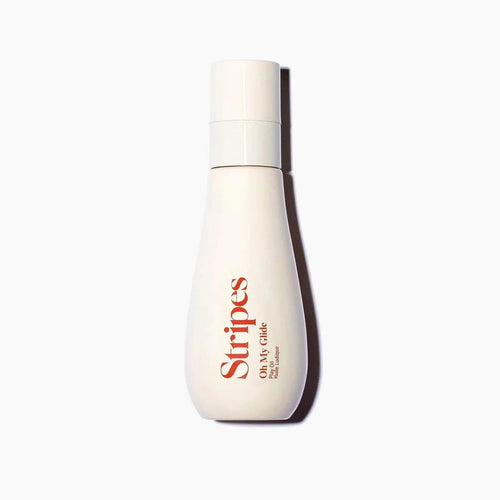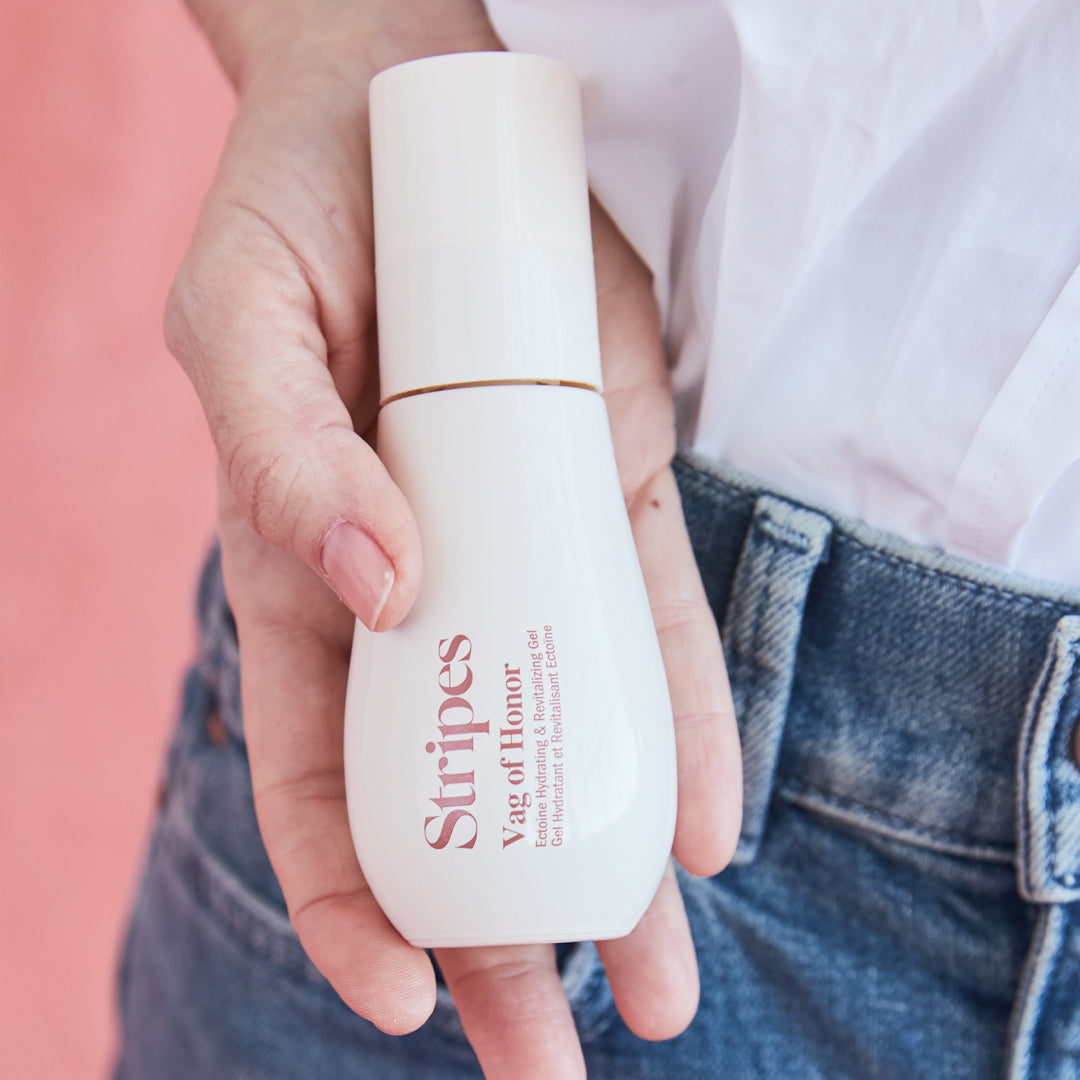Lube + Vaginal Moisturizer = Your Sexual Wellness BFFs
Has your vagina been acting weird lately? You know, has it felt kind of dry? Or irritated? Maybe even itchy? Has sex stopped feeling like you are being transported to a sensual realm of infinite physical pleasures, and started to feel like…well, painful rug burn?
While it may not quite be the stuff of dinner party conversation, it’s important to talk about, because vaginal dryness is one of the most common symptoms of menopause and perimenopause. But the great news is that for many people, it can be treated fairly easily, with nonprescription lube and moisturizer that can work for any budget.
So let’s talk about sex, baby — specifically, let’s talk about painful sex, and how to make it feel better.
Vaginal dryness and painful sex: Why is this happening?
If your vag has been feeling dry and irritated lately, especially when you’re having sex, you can blame the drop in estrogen levels that accompanies peri/menopause. That decline, says Suzanne Fenske, a board-certified gynecologist and founder of TārāMD, “causes the change in the vaginal tissue. It actually becomes thinner and less pliable.”
Some people might only feel pain and discomfort during sex, but others might feel it during urination, or feel it all the time, no matter what they’re doing. And it isn't limited to the vagina proper — the skin of the vulva and vestibule (the entrance to the vagina) can also get dry and irritated, even itchy. "These symptoms bring patients in, thinking that they have a urinary or vaginal infection," says Wen Shen, board-certified gynecologist and associate professor of clinical gynecology and oncology at the Johns Hopkins Medicine Department of Gynecology and Obstetrics.
You might notice it most during sex, when the thinner tissue plus a natural age-related decrease in lubrication can make anything penetrative feel painful, or even tear the skin (Shen notes that patients have described it as "like paper cuts" or "like a hot poker"). And our responses to painful sex, like tensing our muscles, can create their own problems.
“If you have sex when it’s painful, this is going to cause downstream problems such as difficulty with orgasm and pelvic floor tension,” notes Lauren Streicher, a clinical professor of obstetrics and gynecology at Northwestern University’s Feinberg School of Medicine and author of Slip Sliding Away: Turning Back the Clock on Your Vagina.
Tensing the pelvic floor muscles in response to painful sex can create additional pain, which is why “eliminating painful sex is important from the get-go,” says Streicher.
Shen notes that roughly 50% of women experiencing menopause and perimenopause "will complain of vaginal symptoms, but in reality, more women may have the symptoms, but are hesitant to discuss it with their medical providers."
Luckily, lube and moisturizer, used in tandem, can be an effective solution for vaginal dryness, painful sex, and other issues that you will probably not be writing about in your family holiday newsletter.

Why lube and vaginal moisturizer?
You probably already know about lube — according to one 2014 study, 65.5 percent of female participants had used lube during sex in their lives. But it only works in the moment and has no long-lasting lubricating effects. “Lubricant is to be used at the time of intercourse to decrease friction, but it doesn’t change tissue,” says Streicher — so just using it alone, you might still feel discomfort.
But using a long-acting moisturizer on a regular basis “increases water in vaginal cells, so you produce your own lubrication,” Streicher says (though Shen notes that moisturizer will not fully restore the tissue to its pre-menopausal state). Combining regular moisturizing with lube during sex can help your vagina stay more flexible and reduce friction, which in turn reduces the chances of tears. So for a truly smooth ride, you’ll want to use both lube and moisturizer.
What lube is right for you?
There are three kinds of lubes: water-based, silicone-based, and oil-based. Water-based lubes are the most common variety and can be used with latex condoms and silicone sex toys. Water-based lubes in flavors or with warming capabilities are usually made with glycerin, which, Fenske notes, “can be more irritating to the vagina, but the glycerin-free [water-based lubes] tend to not taste so good.”
Silicone-based lubes can be used with latex condoms and may last longer than water-based lubes (so you won’t have to reapply as often). But they do degrade silicone sex toys.
Oil-based lubes, like coconut oil, can be right for some people and couples, but oils damage latex condoms and can make a mess. (Psst, check out Oh My Glide).
Picking a vaginal moisturizer
Lube is applied to your vagina during, or immediately before, sex. However, moisturizer for your vag, like moisturizer for your face or body, should be applied regularly as part of your skincare routine, whether you plan on getting some in the near future or not.
“They're meant to be your maintenance therapy for creating that extra layer of protection to the skin,” says Fenske. “They hold in the moisture that naturally exists and also create protection from any sort of exogenous type of stimulus.”
When shopping around for a vaginal moisturizer, Fenske recommends choosing one that "has no scent ideally, no parabens, and [is made with] as clean products as possible.”
“Hyaluronic moisturizers are very nice,” notes Streicher. “Replens long-acting moisturizer works really well.”
Finding an actual vaginal moisturizer can be surprisingly challenging, however, especially since many lubes are marketed with the name “moisturizer” despite not having any moisturizing properties.
“The reason a lot of lubes are called moisturizers is because of marketing,” says Streicher. “’Moisturizer’ sounds nicer, [while] ‘lubricant’ is very clearly for sex. The companies have figured this out, and if you look at a lot of products advertised as moisturizers, they are actually silicone lubricants.”
Use moisturizer regularly, as indicated by the directions or by your doctor, and use lube during sex, and chances are you’ll be able to experience the heat of the moment without feeling like your vagina is literally on fire.
By Gabrielle Moss
Gabrielle Moss is the editor at Stripes. She's the author of Paperback Crush: The Totally Radical History of '80s and '90s Teen Fiction. Her work has appeared in the New Yorker, Slate, GQ, Buzzfeed, Marie Claire and elsewhere.
Image by Cliff Booth/ Pexels











